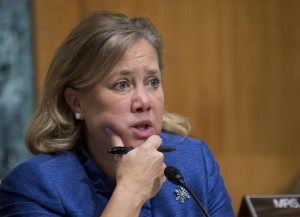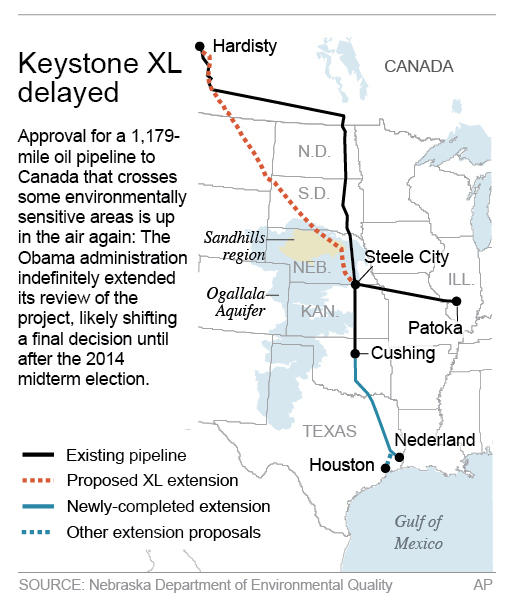The State Department, which must make the final decision on the permit because the pipeline crosses an international boundary, said it would use the additional time to consider the “unprecedented number” – 2.5 million – of public comments that were submitted by March 7.
“The agency consultation process is not starting over,” the State Department said in a statement. “The process is ongoing, and the Department and relevant agencies are actively continuing their work in assessing the Permit application.”
The move drew sharp condemnation from the pipeline’s supporters, who noted that it was now certain that the pipeline owner, TransCanada, would miss another warm weather construction season.
“Once again, we’re hearing more delays and more uncertainty over the Keystone XL pipeline,” said Sen. Heidi Heitkamp of North Dakota, one of 11 Democratic senators who in an open letter last week urged the Obama administration to approve the pipeline. “It’s absolutely ridiculous that this well-over-five-year-long process is continuing for an undetermined amount of time.”
“This most recent delay leaves everyone waiting in limbo – federal agencies, construction and energy workers and companies, state officials and Canada,” Heitkamp said.

Sen. Mary Landrieu
Sen. Mary Landrieu (D-La.), chairman of the Senate Energy and Natural Resources Committee, vowed to use her position to get the pipeline approved. In a statement, she called the delay “irresponsible, unnecessary and unacceptable.” She also said, “By making it clear that they will not move the process forward until there is a resolution in a lawsuit in Nebraska, the [Obama administration] is sending a signal that the small minority who oppose the pipeline can tie up the process in court forever. There are 42,000 jobs, $20 billion in economic activity and North America’s energy security at stake.”
[Democratic Sen. Mark Pryor (Arkansas) said in a statement “there’s no excuse for another delay.” Democratic Sen. Mark Begich (Alaska) said, “I am frankly appalled at the continued foot-dragging by [the Obama administration] on the Keystone project.”All three of these senators are up for re-election this fall.]
Democratic supporter Terry O’Sullivan, president of the Laborers’ International Union of North America said: “Once again, the [Obama administration] is making a political calculation instead of doing what is right for the country.”
Foes of the pipeline, however, drew encouragement from the delay.
“We believe that the more the facts come to light, whether on disastrous climate impacts or threats to our waters [in Nebraska], it makes us even more confident that President Obama and Secretary of State [John] Kerry will ultimately find that this pipeline is not in America’s interests and must be rejected,” said Tiernan Sittenfeld, senior vice president for government affairs at the League of Conservation Voters [a political advocacy organization that lobbies on environmental issues].
Billionaire Democratic donor Tom Steyer, a California hedge fund founder now campaigning against the pipeline, said the delay was “sensible.” “It’s important to do this right,” Steyer said. “If they feel as if they need more time and more work to understand this fully, then I’m behind them.” [Forbes reports: “Steyer made much of his money at Farallon Capital by investing in fossil fuel producers, before he saw the light and became an anti-carbon crusader. Billionaire oilman Harold Hamm calls Steyer “the world’s biggest hypocrite.'”
The Nebraska court case revolves around a group of landowners who oppose the project. Last year, Nebraska Gov. Dave Heineman (R) backed and signed legislation designed to speed the project by approving TransCanada’s route and letting the company use the power of eminent domain in negotiating right of way for the project. A group of landowners filed suit.
On Feb. 19, the District Court of Lancaster County in Nebraska ruled that the legislature had usurped eminent domain powers that belong to the Nebraska Public Service Commission. The judge, Stephanie Stacy, called the governor’s decision “unconstitutional and void.”
The state attorney general immediately appealed the case to the state Supreme Court. That could take months. If the lower court ruling is upheld, TransCanada would need to obtain a permit from the Nebraska Public Service Commission, which could take up to seven months, according to Jane Kleeb, head of Bold Nebraska and a leading foe of the pipeline. TransCanada also might have to renegotiate rights of way with landowners who might be in a better bargaining position. Kleeb notes that TransCanada’s construction permit in South Dakota expires June 20.
TransCanada chief executive Russ Girling issued a statement saying he was “extremely disappointed and frustrated with yet another delay.”
Girling said that while the Nebraska Supreme Court is considering the case, the law signed by the governor and the existing route were “still valid.” The route, already altered once to largely avoid the state’s ecologically sensitive Sand Hills, also was evaluated by the Nebraska Department of Environmental Quality, Girling noted.
A senior State Department official, speaking on a background conference call with reporters, said, “We are prudently recognizing that the facts that the agencies need to assess could change.”
Girling said that without the pipeline, the United States would buy crude oil from “suspect and aggressive foreign leaders” and import Canadian oil by rail and barge, with more greenhouse gases and spill risks.
“Not building Keystone XL is a lose, lose, lose scenario any way you look at it,” he said.
Reprinted here for educational purposes only. May not be reproduced on other websites without permission from The Washington Post.

 The 90-day period for inter-agency comments was supposed to end May 7, but the State Department extended that deadline, citing “uncertainty” created by a Nebraska Supreme Court ruling that could lead to changes in the pipeline route.
The 90-day period for inter-agency comments was supposed to end May 7, but the State Department extended that deadline, citing “uncertainty” created by a Nebraska Supreme Court ruling that could lead to changes in the pipeline route.